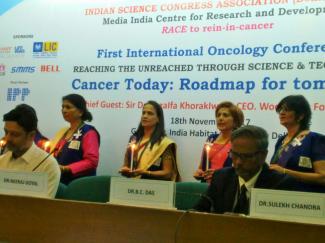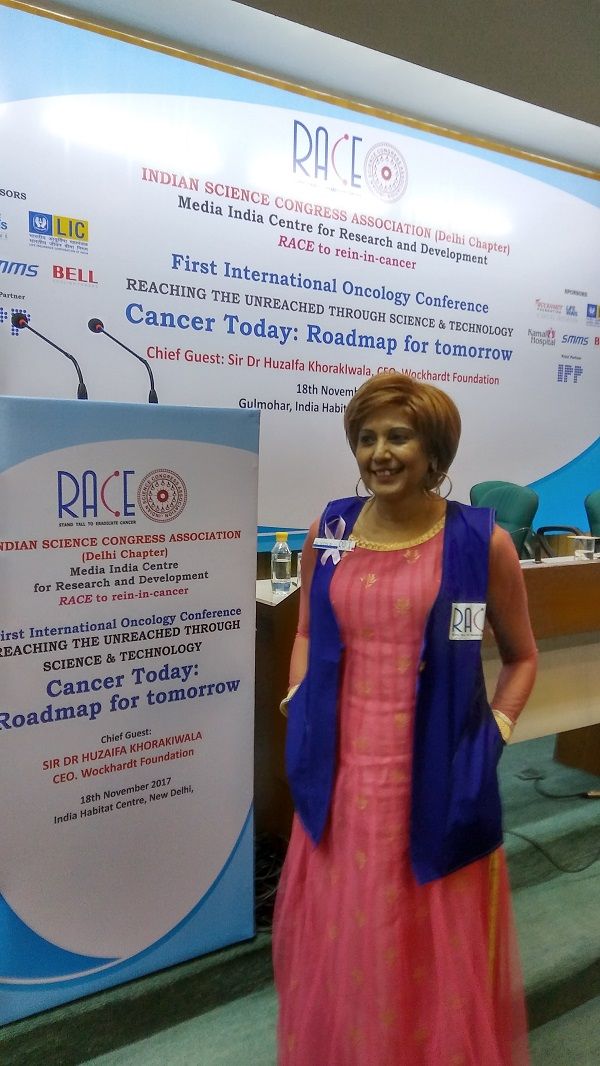
Race to Rein-in-Cancer organised a Cancer Conference in New Delhi to focus on the need for early detection and to set the perspective right for Cancer prevention and treatment now and in the coming years.
Race to Rein-in-cancer in collaboration with Indian Science Congress Association (Delhi Chapter) and Media India Centre for Research & Development organised an informative and well organised Oncology Conference at India Habitat Centre in New Delhi on 18th November. A risk factor in the already rapidly growing incidence of this disease is the detection at a later stage, which very often renders the person beyond treatment. The oncology conference, the theme of which was ‘Cancer Today: Roadmap for Tomorrow’, was mainly dedicated towards how early detection is the surest way of overcoming cancer.
Race to Rein in Cancer, a non-profit organisation whose Founder President is Dr Rita Banik, a cancer survivor herself, is joined by Indian Science Congress Association in doing a commendable job in spreading awareness of Cancer by penetrating even remote cities and villages in India. As Dr Banik put it rather succinctly, “This conference is principally aimed at educating the audience on a holistic approach to cancer treatment including genetics, relapse and alternative therapies.” Amidst hectic sessions, she reiterated, “We wanted this meet to be a learning and a sharing platform for doctors, students, cancer caregivers, volunteers and cancer care NGOs”.
Following the customary inauguration and a message by Chief Guest Dr Huzalfa Khorakiwala, the Plenary session started with some very interesting discussions, specially the presentation by Dr Sujata Satapathy of the Department of Psychiatry, All India Institute of Medical Sciences, New Delhi. She concentrated on the psychological treatment options for cancer and also spoke about the different facets of childhood cancer including bullying. Dr J.K. Singh, National President of Cancer Care India, talked about how cancer care in India can be economised . Cancer management, as pointed out by Dr Singh, is two-fold: Radical and Palliative. He also emphasised on the importance of screening with either single or multiple visits and vaccination. As Dr Singh said, “A single visit can prevent about 26% to 30% of cancer cases.”
An important and topical discussion in the second session comprised a presentation and a quick discussion by Dr Radha Goyal, Deputy Director – Indian Pollution Control Association, on the role of Air Pollution Exposure to the growing incidence of lung cancer in the National Capital Region as well as in other parts of the country and how vital it is to be aware of it. She came up with the disturbing statistic that air pollution has increased cancer by 14 per cent and that Lung cancer is the 4th most common form of cancer in men around the world.
The third session kicked off with a vibrant presentation by Ms Ranjit Kaur, President – Breast Cancer Welfare Association of Malaysia, who spoke on the value of life in advanced breast cancer cases. She touched on some vital issues like peer support, face to face group sessions, public education, the cost of cancer treatment, including a debate over GST on cancer drugs. The dilemmas of advanced breast cancer include uncertainty (which causes hindrance to planning), dealing with a judgmental society as well as the emotional and financial burden on the family and even the option of going drugless for many patients, who feel it to be the easier way out, in the absence of better alternatives.
Bina Akhtar, Senior Counsellor and Trainer, at CanSupport, New Delhi, an organisation that organises doorstep palliative care on a reasonably big scale, touched on some key points of cancer care, like delving into the psycho-social issues of cancer patients. The reactions are wide-ranging, from non-acceptance (Why Me?) to fear (of treatment and the huge financial implications) to shame and guilt to low confidence levels, sadness and a withdrawing attitude. People resort to different coping mechanisms. A typical scenario would throw up both the patient’s reality and the family’s reality and both have to be handled with care.

Ms Renu Saigal, President – Sahayta Charitable Welfare Society, had a personal story to tell about herself and her family’s battle with the Cancer and how, despite personal losses, she continues to be a crusader. A personal account is almost always a reality check.
The penultimate round of discussions held a rather useful interaction Dr A. Shukla as the moderator together with Dr J.K.Singh, Dr Geeta Kadayaprath, Ms Rosemary Kelly and Dr D. Pendharkar. The discussion was on whether Breast cancer is hereditary (According to Dr Geeta, 20% to 30 % are genetic) and how Genetic counselling is important for a test being done. Dr Geeta, Head - Breast Surgery, Max Healthcare, New Delhi, who leads workshops and counselling sessions even in the remote areas of the country where awareness needs to be spread the most, said how breast self-examination is so much more important than even a mammography.
The evening had a befitting finale with some songs by a young student and amidst chants of “Hum honge kaamyab ekdin....”






